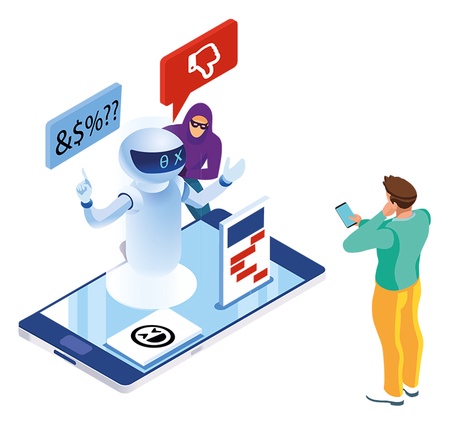This month we look at how the advent of social media and mass communication has facilitated bullying and harassment at an unprecedented rate, and what we can do to protect ourselves.
These issues are nothing new, but unfortunately our modern, ‘always-on’ culture has only served to exacerbate them. Here’s why:
- Perceived anonymity: It’s easy for perpetrators to create fake social accounts and throwaway email addresses making them believe their activity cannot be traced. (In reality, it almost always can be traced.)
- Wide reaching: Bullying posts can be seen by unlimited numbers of people, particularly if they go viral. This can cause the victim extreme stress and anxiety.
- Victim impact is not visible: Unlike face-to-face bullying, the perpetrator cannot see the victim’s reaction and so there is no trigger for natural empathy.
- Difficult to identify: Much hostile activity is sent via direct messages or closed groups and is therefore not visible to authority figures.
- Accessibility: In the online world, a victim is always accessible.
Tips for keeping yourself and others safe online
Think before you post. Consider the impact your post may have on others. Something said in jest may be interpreted differently by others, and they may dwell on it for long periods. Your posts may also inflame others and attract negative attention back on yourself.
There is no such thing as an ‘off the cuff’ remark online. Even if you delete a post it may still have been recorded by others and will certainly be retrievable by the social platform.
Make the most of account privacy settings. Lock down your profiles to close friends and family only. Most platforms also allow you to restrict who can contact you. If you’re not sure how to do this, your social media platform provides inline help and support.
Reporting Bullying and harassment. If you witness, or fall victim to, bullying or harassment online always report it.
Even if no criminal offence has taken place, harassment is a serious violation of the terms of service for any social media platform, organisation, or Internet Service Provider. Providers can take action against anyone who abuses their terms.
The University of Aberdeen is no exception. Cyberbullying runs contrary to our Core Value of Respect for all within the organisation and beyond. Any breach is considered a serious disciplinary offence for both staff and students.
And if you believe a criminal offence has taken place, report it to the Police non-emergency line by dialling 101.
Protecting vulnerable users. Unfortunately, most children and teenagers will experience or see cyberbullying at some time. However, we can do a lot to help mitigate the risks:
- Friend or Follow them on all platforms so you can monitor activity.
- Ensure they are old enough to use a platform according to its terms of service.
- Remember – games consoles are computers that can access the same services as a smartphone. Monitor use and keep them in family rooms where possible.
- Use parental settings on all devices as well as your Wi-Fi router and children’s sim data plans. This can restrict activity as well as limit screen time.
- Be watchful for any secretive behaviour, particularly if they become anxious or angry about you accessing their devices.
To learn more about protecting vulnerable web users visit Internet Matters.
And don’t forget to look after yourself
If you fall victim to cyberbullying, you are not alone.
- Report it to the appropriate authority, as described above.
- Talk about it – cyberbullying and online harassment can seriously impact your mental health.
- The University offers a wide range of counselling services for staff and students. Our student web pages also include an extensive list of specialist and online resources.
Author: IT Security Team, Digital and Information Services


